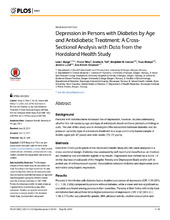| dc.contributor.author | Berge, Line Iden | en_US |
| dc.contributor.author | Riise, Trond | en_US |
| dc.contributor.author | Tell, Grethe Seppola | en_US |
| dc.contributor.author | Iversen, Marjolein M. | en_US |
| dc.contributor.author | Østbye, Truls | en_US |
| dc.contributor.author | Lund, Anders | en_US |
| dc.contributor.author | Knudsen, Ann Kristin | en_US |
| dc.date.accessioned | 2016-02-08T13:42:10Z | |
| dc.date.available | 2016-02-08T13:42:10Z | |
| dc.date.issued | 2015-05-26 | |
| dc.Published | PLoS ONE 2015(5):e0127161 | eng |
| dc.identifier.issn | 1932-6203 | |
| dc.identifier.uri | https://hdl.handle.net/1956/11047 | |
| dc.description.abstract | Background: Persons with diabetes have increased risk of depression, however, studies addressing whether the risk varies by age and type of antidiabetic treatment have yielded conflicting results. The aim of this study was to investigate if the association between diabetes and depression varied by type of antidiabetic treatment in a large community based sample of middle-aged (40–47 years) and older adults (70–72 years). Methods: Data from 21845 participants in the Hordaland Health Study (HUSK) were analyzed in a cross-sectional design. Diabetes was assessed by self-report and classified as un-medicated, treated by oral antidiabetic agents or by insulin. Depression was defined as a score ≥8 on the depression subscale of the Hospital Anxiety and Depression Scale and/or self-reported use of antidepressant agents. Associations between diabetes and depression were estimated using logistic regression. Results: Persons in their forties with diabetes had a doubled prevalence of depression (OR: 1.96 (95% C.I.: 1.35, 2.83)) compared to persons without diabetes, while a lower and non-significant association was found among persons in their seventies. Persons in their forties with orally treated diabetes had about three times higher prevalence of depression (OR: 2.92 (95% C.I.: 1.48, 5.77)) after adjustment for gender, BMI, physical activity, alcohol consumption and education, compared to non-diabetic persons in the same age-group. No association between depression and insulin or un-medicated diabetes was found. Conclusions: Clinicians should be aware that persons in their forties with orally treated diabetes are at a marked increased risk of depression. | en_US |
| dc.language.iso | eng | eng |
| dc.publisher | PLOS | eng |
| dc.rights | Attribution CC BY | eng |
| dc.rights.uri | http://creativecommons.org/licenses/by/4.0 | eng |
| dc.title | Depression in Persons with Diabetes by Ageand Antidiabetic Treatment: A Cross-Sectional Analysis with Data from the Hordaland Health Study. | en_US |
| dc.type | Peer reviewed | |
| dc.type | Journal article | |
| dc.date.updated | 2015-12-21T20:14:24Z | |
| dc.description.version | publishedVersion | en_US |
| dc.rights.holder | Copyright 2015 The Authors | |
| dc.identifier.doi | https://doi.org/10.1371/journal.pone.0127161 | |
| dc.identifier.cristin | 1265205 | |

